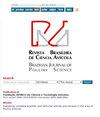Emulsifier in Diets with Different Alternative Lipid Sources: Effects on the Health of Japanese Quails
IF 1.1
4区 农林科学
Q3 AGRICULTURE, DAIRY & ANIMAL SCIENCE
引用次数: 0
Abstract
The present research aims to evaluate the inclusion of an emulsifying additive based on mono-and diglycerides of fatty acids in diets with different lipid sources, studying its effects on duodenum histology, biometry of the digestive and reproductive tract, and blood biochemical profile of Japanese quails. The study was carried out in the experimental aviary of the Federal University of Grande Dourados, Mato Grosso do Sul, Brazil. The experimental design was completely randomized, with diets in a 3x2 factorial design with three different lipid sources (soybean oil, poultry fat, and beef tallow), either supplemented or not with an emulsifier. The birds that received a diet composed of poultry fat and an emulsifying additive had a larger gizzard. Animals that received a diet containing an emulsifier, regardless of the lipid source, had greater heart weight. The duodenum of animals that received bovine tallow in their diet showed a greater height and villus:crypt ratio. Biochemical parameters were not affected by either the lipid source or the inclusion of emulsifier in quail diets. The biochemical blood profile of birds in treatments did not show significant changes among all diets used. The use of soybean oil, bovine tallow, and poultry fat with or without the inclusion of an emulsifier does not show changes in the health and development of the quails’ organs, which also indicates that the health of Japanese quails in the laying phase is kept in good standards.乳化剂对日本鹌鹑健康的影响
本文章由计算机程序翻译,如有差异,请以英文原文为准。
求助全文
约1分钟内获得全文
求助全文
来源期刊

Brazilian Journal of Poultry Science
农林科学-奶制品与动物科学
CiteScore
1.80
自引率
9.10%
发文量
60
审稿时长
>12 weeks
期刊介绍:
A Revista Brasileira de Ciência Avícola surgiu em 1999 a partir da necessidade que a comunidade científica possuía de um periódico para veiculação e publicação de seus trabalhos, com a publicação de três números anuais.
A Revista conta hoje com um corpo editorial altamente qualificado e com artigos científicos desenvolvidos pelos maiores especialistas da área, o que a cada dia atrai mais leitores em busca de inovação e respaldo técnico.
Devido à credibilidade que conquistou pelos esforços de sus autores, relatores e revisores, a Revista ganhou caráter de coleção, sendo consultada como fonte segura de estudo desenvolvidos na Avicultura.
A partir de 2003 – volume 5 -, a Revista passou a chamar-se Brazilian Journal of Poultry Science, e todos os trabalhos passaram a ser publicados em inglês. No mesmo ano subiu para quatro o número de revistas por volume, ampliando-se assim os trabalhos publicados anualmente.
 求助内容:
求助内容: 应助结果提醒方式:
应助结果提醒方式:


